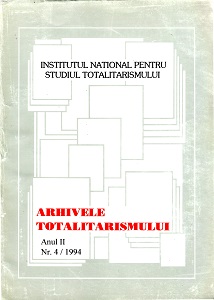Dictionar biografic
Biographical dictionary
Author(s): Dan Dungaciu, Flori Stănescu, Florica Dobre, Anișoara Budici, Adrian Brișcă, Horia Nestorescu-BălceștiSubject(s): Military history, Political history, Social history, Recent History (1900 till today), History of Communism
Published by: Institutul National pentru Studiul Totalitarismului
Keywords: biographies; Anton Golopenția; Petru Groza; Paul Halunga; Horia Măcellarin; Vasile Motrescu; Ana Pauker;
Summary/Abstract: Anton Golopenția (1909-1951) Anton Golopenția was arrested in 1950 by the communist regime, the charge being his "politics”, despite his nonpolitical activity and. after 18 months of imprisonment, he died in jail, without having been brought to trial; his family could not have his body for the funerals. Petru Groza (1884-1958) Until 1944. when the Soviet troops invaded Romania’s territory. Petru Groza was a political mediocrity at the national level. After 1933, although educated in European universities (Budapest. Berlin, Paris, London, Brussels, Leipzig), he would adopt a more and more pronounced left-wing position. On March 6. 1945. he was appointed as President of the Council of Ministers. In 1958. the year of his demise, he was holding the position of President of the Presidium of the Great National Assembly, officially the highest position in state. Through the positions held and his ideological compliance, the bourgeois Petru Groza credited and contributed to the installation of the communist regime in Romania. Paul Halunga (1895-1941) While very early in his military career, appreciated as an officer of great expectations and later on an elite officer of the Romanian army, in the inter-war period Paul Halunga held positions adequate to his rank, and distinguished himself through his entire activity. He obtained remarkable results on the Eastern Front, as a commander of Regiment 10 Rangers, during the battles in Bessarabia and on the Odessa Front, where he died in battle on August 28. 1941. Horia Măcellarin (1894-1989). Horia Măcellariu had a brilliant military career, and in 1941, he was appointed Chief of the Navy General Staff. In 1943, Horia Măcellariu yvas involved in the Crimea evacuation operation, and in 1944 he yvas appointed Counter Admiral. Brought to trial in October 1948 as one of the leaders of the National Resistance Movement, he got a life sentence to hard labour and all his property was confiscated. Released in 1964. after having served time in the prisons of Aiud. Râmnicu-Sărat. Gherla, he died in Bucharest, on July 11. 1989. Vasile Motrescu (1920-1958) A poor peasant of Vicovu de Jos. Suceava county. Vasile Motrescu took part as a ranger in the Caucasus and Crimea War (1942-1943). He fought as a partisan against the Russians, in 1944. defending Bukovina. Hunted by the NKVD and Securitate, he defended his life, arm-in-hand, loghether with Contantin Cenușă, between 1949-1951 and with Gavril Vatamaniuc between 1952-1955. He saved a partisan group in Făgăraș and confronted a Securitate company at Batea Corbului. He also sent a series of daring letters to the Romanian communist leaders. He was sentenced to death in contumacy. Betrayed, he was captured and executed in 1958. Ana Pauker (1893-1960) Undoubtedly, one of the prominent figures in the communists' fight for power in Romania, after 23 August, 1944, was Ana Pauker. Wearing the aura of the Comintern's international activist, enjoying Moscow’s full support, even seemingly that of Stalin himself, Ana Pauker was propelled by the external party wing to the highest rank. Yet she encountered the silent, tenacious and tough opposition of Gheorghe Gheorghiu-Dej. Under the circumstances, she was a victim of the fight for power between the so-called national wing of the Communist Party in Romania and the international wing consisting mostly of Jewish activists. The fight started in 1952, when the group of Ana Pauker, Vasile Luca and Teohari Georgescu was annihilated and was concluded with the elimination of Iosif Chișinevschi and Miron Constantinescu, in 1957.
Journal: Arhivele Totalitarismului
- Issue Year: II/1994
- Issue No: 4
- Page Range: 207-223
- Page Count: 17
- Language: Romanian
- Content File-PDF

